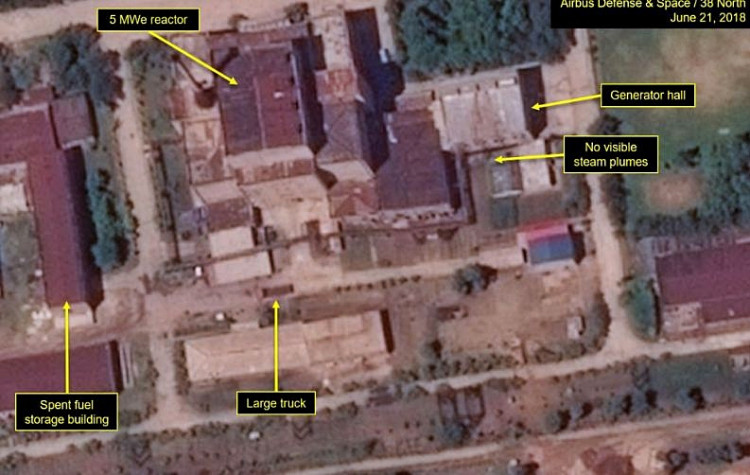North Korea is making rapid improvements to its main nuclear weapons plant, the Yongbyon Nuclear Research Facility 100 km north of Pyongyang. This violates a promise made by Chairman Kim-Jong-un to U.S. president Donald Trump on June 13 to work toward "complete denuclearization" of the Korean Peninsula.
New commercial satellite imagery provided by 38 North, a website devoted to analysis about North Korea, reveal the rapid pace in the construction of new buildings and the completion of a plutonium production reactor and other support facilities at Yongbyon. Analysis of the photos and the crafting of the report were conducted by Frank Pabian, Joseph Bermudez Jr., and Jack Liu.
Satellite imagery from June 21 reveals that modifications to the 5 MWe plutonium production reactor's cooling system appear complete. The status of the Radiochemical Laboratory, which is used to separate plutonium from spent fuel rods, remains uncertain, however.
38 North also said, "construction continues on support facilities throughout other operational areas of Yongbyon, especially at the Experimental Light Water Reactor (ELWR), where the new engineering office building appears externally complete and a small building similar to the one observed at the Radiochemical Laboratory has been erected."
In addition, modifications to the site's 5 MWe reactor's secondary cooling loop, which began in March, appear externally complete. "A newly in-filled water channel (that includes a newly installed probable weir for controlling water flow) now leads to the pump house from the Kuryong River, which provides cooling water for the Yongbyon nuclear reactors.
Determining the operational status of the reactor is somewhat difficult at this time, according to 38 North. The images do show "improvements to infrastructure" but the report said the "continued work at the Yongbyon facility should not be seen as having any relationship to North Korea's pledge to denuclearize."
38 North said the ongoing upgrades at Yongbyon emphasize "why an actual deal is necessary, not just a statement of lofty goals."
On June 13, or the day after Trump met Kim in Singapore, Trump declared that Pyongyang was "no longer a nuclear threat." On June 23, however, he renewed longstanding sanctions on North Korea, citing the "extraordinary threat" to the country's nuclear weapons pose.






